Another key step towards a new, universal climate change agreement has just been taken as the negotiating text for the agreement was officially issued by the UN Framework Convention on Climate Change.
The text was agreed at the UN Climate Change Conference in Geneva earlier this month, and covers the substantive content of the new agreement including mitigation, adaptation, finance, technology, capacity building, and transparency of action and support.
UNFCCC Executive Secretary Christiana Figueres said. “I’m delighted that the negotiating text from which the Paris agreement will be constructed has now been officially published. This will allow early consideration of the text on the part of governments.” The negotiating text will be formally communicated to all governments that are Party to the Convention as soon as it becomes available in all six official languages of the UN. The expectation is that this could be achieved by the end of March, thus amply fulfilling procedural requirements for adoption of the agreement at the end of the year.
This milestone kick-start a year of intense negotiations and political efforts focused on completing the new agreement and building broad-based momentum across all levels for a unified and lasting response to the challenge of climate change. “I welcome the broad-based engagement of Heads of State and Ministers ranging from finance to health to energy. The new agreement will not only be of relevance to Ministers of environment, but will be of key relevance across all government ministries and departments committed to the triple intertwined agendas of 2015: namely climate action, the realization of a suite of Sustainable Development Goals and progressing on disaster risk reduction,” Ms. Figueres stated.
Negotiators will reconvene at the Climate Change Conference in Bonn from 1 to 11 June to seek convergence, find ways to bridge positions and reach common understandings. “The June session will be of crucial importance,” Ms. Figueres said. “I would like to call on all governments to empower their negotiators to come prepared to make choices in June and to converge on outcomes all Parties can accept,” she added.
Additionally, negotiators will identify elements within the negotiating text that are of a durable nature and therefore need to be enshrined in the agreement, and aspects that are more suitable to be contained in decisions at the UN Climate Change Conference in Paris. This could mean, for example, that the establishment of a mechanism that boosts the response to climate change would be enshrined in the agreement, but the details of how this mechanism would operate would be captured in an accompanying decision.
Following the June conference, two further formal sessions have been scheduled in Bonn, from 31 August to 4 September and from 19 to 23 October.




